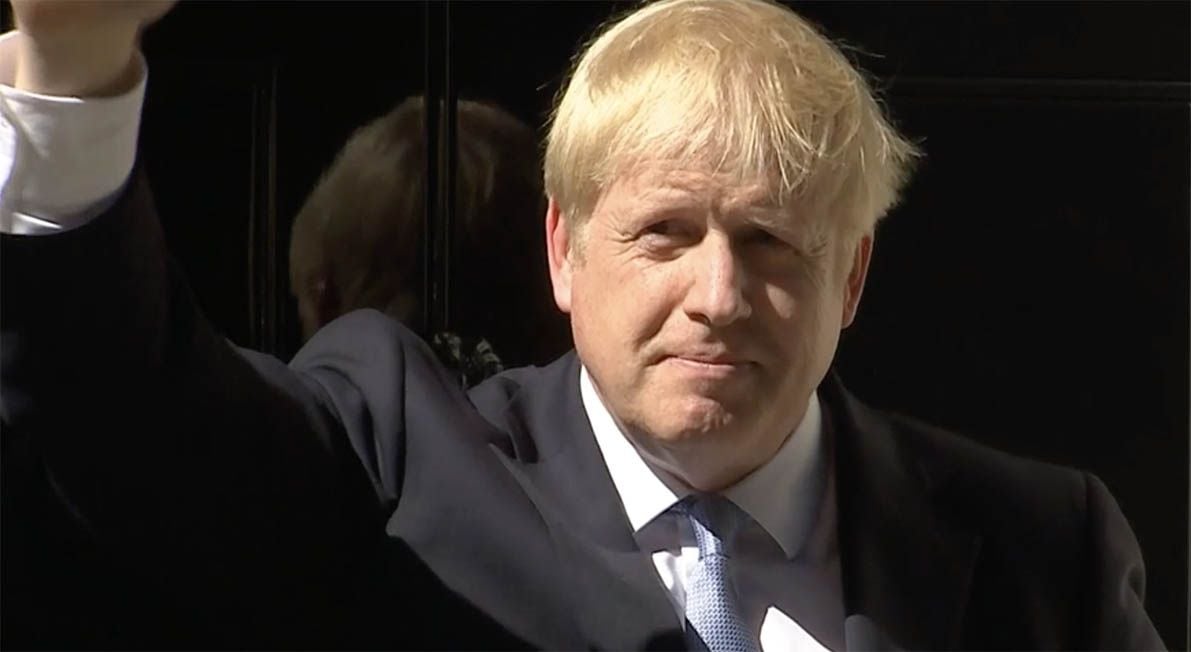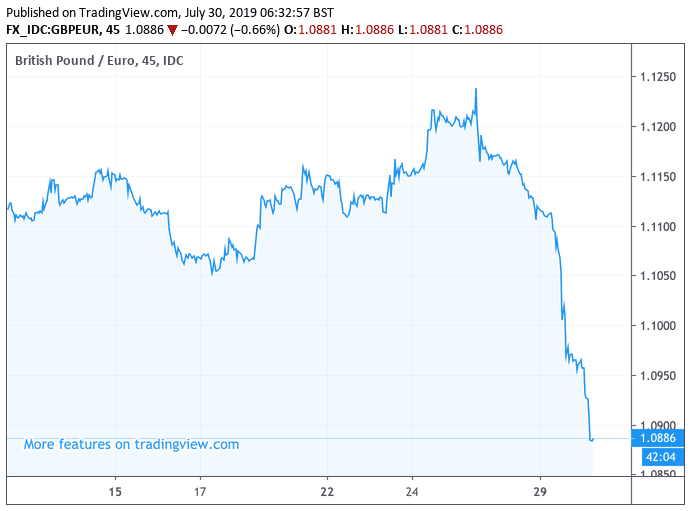Yet More Losses for Pound Sterling Forecast

Above: Boris Johnson. © Pound Sterling Live. Still courtesy of BBC News
- Pound Sterling tests fresh two-year lows
- Analysts warn of further downside
- Uncertainty exists as to exactly where the selling will end
Over the course of the past week, Sterling has fallen 2.78% against the Euro and 2.63% against the Dollar as a fresh impulse of selling grips the markets as traders and investors race to find new valuations for the 'no deal' Brexit they now assume will occur on October 31.
At the time of writing on Wedneday, the GBP/EUR exchange rate is quoted at 1.09, and the GBP/USD exchange rate at 1.2164: both pairs are off their recent two-year lows but remain fragile and prone to fresh losses.
Following the sharp falls witnessed at the start of the week, foreign exchange analysts are updating their views on the prospects for the British Pound: heading into the second-half of 2019 consensus amongst analysts had been for both GBP/EUR and GBP/USD to end the year materially higher than current levels.
But unless a deal is reached by the EU and UK ahead of October 31, these forecasts will prove to be wildly out of touch.
"The message for the EU was uncompromising and heralds a confrontational summer. We remain strategic GBP bears as the UK will struggle to finance the outsize current account deficit at a time of maximal political risk, minimal growth and minimal yields," says Paul Meggyesi, a currency analyst at JP Morgan.
"We see more GBP weakness to come. The current Sterling meltdown is in line with our view that GBP risks are heavily skewed to the downside given the Brexit uncertainty and rising odds of an early election (our base case)," says Petr Krpata, a foreign exchange analyst with ING Bank N.V.
ING are forecasting the Pound-to-Euro exchange rate to head towards the 1.05 level with the Pound-to-Dollar exchange rate falling to 1.18.
"Politics should remain the key negative for Sterling in the months to come. There is more scope for risk premia to be built into the pound while the Bank of England is unlikely to offer much help to the battered currency," says Krpata.
The Pound fell sharply on Monday and extended its losses into the Tuesday session as markets rapidly ramped up their expectations for a 'no deal' Brexit outcome occurring on October 31, the official Brexit date.
The market's reassessment of the political landscape has comes after the new administration of Boris Johnson made it clear that the existing EU-UK Brexit deal is "dead" and that a new arrangement must be agreed.
The fall in Sterling suggests markets have finally cottoned on to the fact that a deal is now unlikely.
"Even in the unlikely scenario that Brussels is willing to reopen the Withdrawal Agreement, it is almost inconceivable that the UK government and Brussels will be able to reach a deal that could be ratified into UK law by October 31. An extension of the October 31 deadline is still possible, but in that case we cannot see any plausible result except early elections," says Stephen Gallo, European head of FX strategy at BMO Capital Markets.
Above: Sterling's decline against the Euro extends into Tuesday
“There is no end in sight to the embattled British Pound’s plight with both the current Prime Minister Boris Johnson and the leader of the official opposition Labour Leader Jeremy Corbyn promoting policies that will deliver fresh - and serious - blows to the currency,” says Nigel Green, CEO of de Vere Group. "Johnson is ramping up no-deal preparations and it looks increasingly likely the UK crashes out of the EU in a no-deal scenario in October. Even though this has largely been priced-in by the markets, there can be no doubt that it has also intensified uncertainty and, in response, the already weak Pound fell and continues to flounder."
Green expects the selling of Sterling to continue as "the Johnson administration takes brinkmanship with the EU to a higher level, the closer we get to the Brexit deadline... should the UK leave with no-deal, the Pound can be expected to remain weak for several years until the country and the bloc readjusts," says Green.
The EU have repeatedly said they are not willing to renegotiate the existing deal: both sides have now set their 'red lines' so far apart markets are awake to the fact that they are unlikely to bridge their differences in order to avoid a 'no deal' Brexit.
A regular press briefing in Brussels saw an EU Commission spokesperson say a 'no deal' Brexit was not a desired outcome but the EU is "very much prepared" for such an eventuality.
"My strongest view remains that GBP has further to fall in order to catch up with recent political developments. The consensus view, I believe, has always been that ultimately a soft Brexit deal would be negotiated or better still a 2nd referendum would avert. The odds on this have shifted markedly in the past days and weeks and despite recent weakness I suspect the GBP needs to fall further," says Jonathan Pierce, on the sales and trading desk at Credit Suisse.
It appears markets have for some time taken solace from a popular view that there is a majority in the UK Parliament against a 'no deal' Brexit, and that MPs could always thwart any Government attempting to deliver a Brexit 'come what may' by October.
However, since Johnson has taken the reins of power it has become clear that Parliament can - at best - only ask the Government to extend the Article 50 period.
This is no long-term fix as the October 31 exit date is enshrined in UK law, and it is quite clear that even were the Government to be ejected by a no-confidence vote there is no onus on the departing Government to head to Brussels to ask for an extension.
In short, Parliament cannot force the Government's hand on the matter.
Sir Oliver Letwin - a prominent Conservative MP who has played a big part in the UK parliament blocking 'No Deal' twice - acknoweldges as much, saying “Parliament may well not be able to stop No Deal…we have to accept that we may find ourselves leaving without a deal”.
"Some combination of a 'no deal' Brexit and/or early elections will probably occur. The two-party system could be breaking down entirely, though much will depend on the mood of the country and how any residual UK/EU negotiations proceed. A political risk discount should remain embedded in the GBP," BMO Capital's Gallo writes, in a note to clients.
BMO Capital have lowered their forecasts for Sterling on the back of the latest developments, with their three- and six-month targets for GBP/USD now resting at 1.16 and 1.15 respectively "owing to the risks of a 'no deal' Brexit and early elections, which could come before year-end," says Gallo.
Time to move your money? Get 3-5% more currency than your bank would offer by using the services of foreign exchange specialists at RationalFX. A specialist broker can deliver you an exchange rate closer to the real market rate, thereby saving you substantial quantities of currency. Find out more here. * Advertisement
According to analysis from Citi, the world's largest foreign exchange dealer, markets entered the new week holding an assumption that a 'no deal' Brexit outcome stood at 30%.
This assumption was clearly off the mark in the face of news headlines suggestion the UK government was serious about getting a dramatically improved Brexit deal, or they would pursue a 'no deal' exit instead.
"We have been pointing out for some time that the market was not pricing in the 'no deal' risk sufficiently and that we are Sterling bears," says Antje Praefcke, an analyst with Commerzbank.
Speaking in Scotland on Monday, Johnson said the existing Withdrawal Agreement negotiated with European leaders was "dead" and had "got to go".
We knew Johnson was always going to be tougher on the issue of Brexit than his predecessor Theresa May, however what appears to have caught markets by surprise is the extent of that toughness.
"I’ve been surprised by the weakness of GBP over the past two days and the pace of the move given Boris as PM should have been baked in the cake and most the negatives were already known," says Jordan Rochester, a foreign exchange analyst with Nomura in London.
Johnson has set the EU a condition of abandoning the current Brexit deal in order to start fresh talks.
Simon Harvey, FX Analyst at Monex Europe says he sees GBP/USD going below the 1.20 level:
"Downside protection on GBP/USD over the 3-month horizon is edging towards levels not seen since March where the UK threatened to slip out of the EU prior to the extension. This is occurring despite cable sitting a full 6 points lower than it did back in March (it was at $1.30+).
"Current momentum and market positioning show markets think lower, or don't want to run the risk at least. We agree, targetting sub $1.20 this quarter on GBPUSD."
What could offer the Pound support from here and limit the ongoing decline in value?
"We need to see the EU provide Boris something new to work with," says Rochester, adding that Johnson could also row back from recent comments, but "he looks to be doing the opposite," notes Rochester.
For now markets appear to believe that the EU and UK are simply too far apart on the issue of Brexit to be brought back together. For one, the EU have said the Irish backstop contained in the existing Withdrawal Agreement has to stay, Johnson says it has to go in its entirety.
Senior EU figures have been notably silent on the matter of Brexit this week, we will be watching for any reactions.
"Let’s wait and see what he can achieve in his talks with EU officials over the coming days and weeks - if such talks will happen at all, since Johnson requires the EU to accept his conditions first (new negotiations) - and whether his Trump-style negotiations will lead to success. I fear not, and therefore remain a Sterling bear," says Praefcke.
Time to move your money? Get 3-5% more currency than your bank would offer by using the services of foreign exchange specialists at RationalFX. A specialist broker can deliver you an exchange rate closer to the real market rate, thereby saving you substantial quantities of currency. Find out more here. * Advertisement

